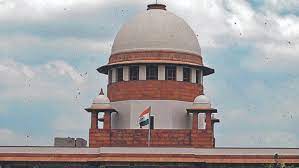According to the appellant, there was an increase in the sale area, earlier provisionally allotted to the respondents, and therefore vide communication/letter dated 27.04.2017, the respective allottees were informed about the increase and revision in the sale area of their apartments. Accordingly, the differential demand letters on account of such increase were issued by the appellant to the allottees of the apartments, including the respondents. The respondents/their respective previous allottees made payments towards the differential demand without any demur or protest between the period December 2017 to August 2018, and the appellant executed the conveyance deeds in their favour between the period April 2018 to September 2019. (Para 5)
Subsequently, the respondents on 25.02.2022 filed a complaint being Consumer Case No. 34/2022 before the National Commission seeking a refund of the amounts paid by them towards the increased sale area alleging, inter alia, that there was neither increase in the carpet area nor in the built-up area, and that the demand towards increase in the sale area made by the appellant was illegal. (Para 6)
The case was resisted by the appellant by filing a reply challenging the very maintainability of the consumer case and contending, inter alia, that no ‘cause of action’ had arisen. According to the appellant, respondent nos. 1, 2 and 5 were the subsequent allottees, who came into picture much after the increase in the sale area and raising of demand therefor. Even the payments for the same were made by their concerned predecessor allottees without any protest. (Para 7)
The National Commission, as stated herein above, by the impugned judgment has directed the appellant to refund the amount and execute supplementary/correction deeds. The appellant being aggrieved by the same, has preferred the present appeal. (Para 9)
At the outset, we must record our disagreement with the finding recorded by the National Commission as to the ‘continuing cause of action’ till 26.08.2020, which is the date when the question of the excess sale area was decided by the National Commission in CC Nos. 285/2018 and 286/2018 titled Pawan Gupta v. Experion Developers Private Limited. The issue of limitation has to be decided as per the provisions in the enactment, in the instant case Section 697 of the Act, which prescribes a two years limitation to file a complaint from the date on which the ‘cause of action’ has arisen. The ‘cause of action’ means every fact, which, if traversed, 7 (Para 11)
The appellant, relying upon Section 98 of the Limitation Act, 1963, which provides that once limitation starts running no subsequent disability or inability to institute a suit or make an application would stop it, have argued that the ‘cause of action’ arose and commenced on 27.04.2017, which is when the appellant had 8 9. Continuous running of time.—Where once time has begun to run, no subsequent disability or inability to institute a suit or make an application stop it: Provided that, where letters of administration to the estate of a creditor have been granted to his debtor, the running of the period of limitation for a suit to recover the debt shall be suspended while the administration continues. intimated the increase in the sale area and, consequently, the enhancement of price. Accordingly, in terms of Section 69 of the Act, which prescribes the limitation of two years from the date on which the ‘cause of action’ has arisen, the limitation had come to an end on 26.04.2019. Therefore, the respondents would not be entitled to the benefit of exclusion of the period from 15.03.2020 to 28.02.2022. (Para 13)
As these aspects and questions are essentially factual, albeit have not been ascertained and addressed in the present case, we would pass an order of remand to the National Commission to examine the issue in light of the dictum laid down by this Court. Upon the facts being first ascertained, the legal principles have to be applied. (Para 17)
The dismissal of the appeal in the case of Pawan Gupta (supra) without any reasons being recorded would not attract Article 141 of the Constitution of India as no law was declared by the Supreme Court, which will have a binding effect on all courts and tribunals in India. (Para 32)
SUPREME COURT OF INDIA
2023 STPL(Web) 193 SC
[2023 INSC 748]
Experion Developers Private Limited Vs. Himanshu Dewan And Sonali Dewan And Others
Civil Appeal No. 1434 of 2023-Decided on 18-8-2023
https://stpllaw.in/wp-content/uploads/2023/08/2023-STPLWeb-193-SC.pdf https://stpllaw.in/wp-content/uploads/2023/08/2023-STPLWeb-193-SC.pdf







